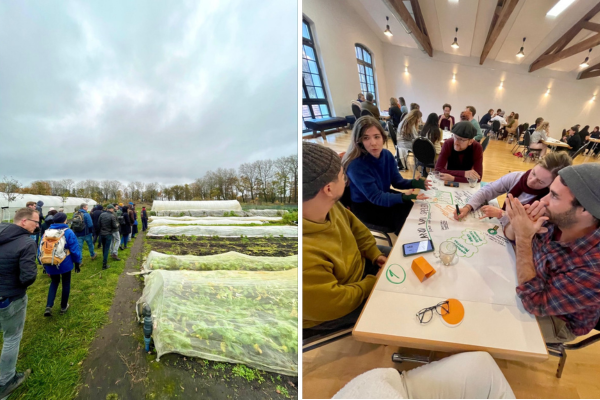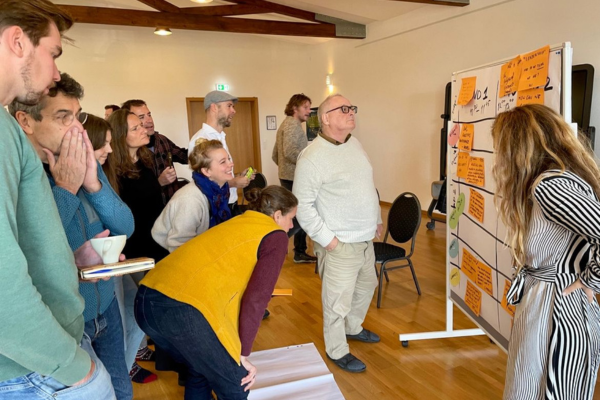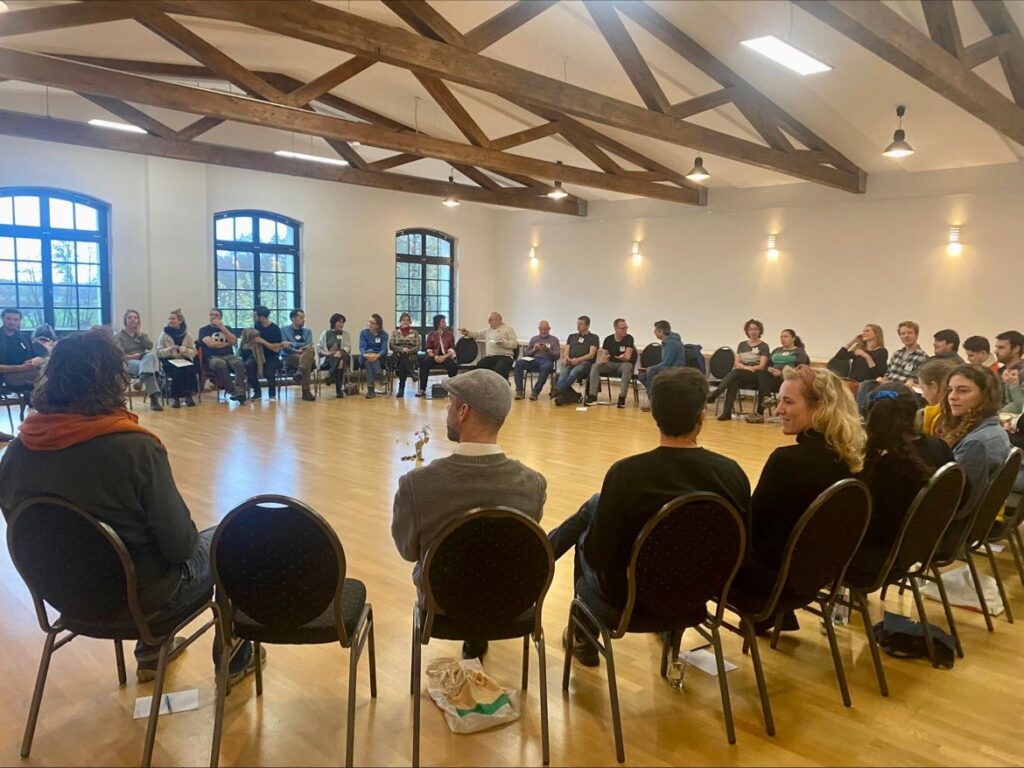
‘De Plaatsen’ builds and brings expertise to European Bioregional Weaving Labs Collective
Lees hier de Nederlandse versie
At Plaats De Kleine Aarde (translated: Place The Little Earth), new prototypes of future-proof agricultural and food systems for the Netherlands may emerge in the coming years. New systems are never developed overnight and always need a mix of people and organizations that feel that things can be done differently, and have the will to let that ‘different thing’ emerge. Learning from each other is essential, and is, literally, about crossing borders. So it is wonderful that De Plaatsen is now intertwined with other European changemakers in the so-called Bioregional Weaving Labs Collective.
We live on a prosperous continent where many things go well. But in recent decades, a time of great disagreement, confusion, and suffering is caused by many different and complex problems happening at the same time: a housing shortage, changing climate, poor water quality, polarization, increased social tensions or the loss of biodiversity; these are just a few examples and require systems to change.
De Plaatsen Netherlands Foundation, with its ecosystem of changemakers, wants to work towards a sustainable and vital food system for the Netherlands. We invite everyone who is directly or indirectly involved: from home chef to farmer, and from financier to researcher or educator. Everyone with the will to do things differently will participate. Together we work towards a vital food system that offers much-needed perspective to everything and everyone.
Systemic changemakers
This approach is not unique. Within Europe, all kinds of changemakers are working on finding alternatives to jammed or dying systems. Among them are also Ashoka fellows, including the founder of De Plaatsen, Geert van de Veer. Ashoka is a global network organization of leaders in systemic change who help each other and work together on new social innovations that make the world a better, more beautiful and healthier place.
Noa Lodeizen is director of Ashoka Netherlands. Together with others like her colleague Karin Müller, Geert van der Veer and Commonland, she founded the Bioregional Weaving Labs Collective 2.5 years ago.
It is a growing collective of system-changing organizations working for large-scale landscape restoration and nature protection while increasing biodiversity. ‘Indeed, many of our fellows are incredibly motivated to bring about change. Many of them are leading pioneering regenerative initiatives to which they are fully committed. But the risk can be that the big picture gets out of sight. It can even lead to getting in each other’s way, or competing for funding,’ she reflects.
European bioregions
Meanwhile, the Bioregional Weaving Labs Collective has started in eight different bioregions in Europe; from Sweden to Spain and from Ireland to Romania. Each of them are areas with complex challenges around themes such as intensive agriculture, degrading soil quality, erosion, biodiversity loss, water pollution, land use imbalance and disconnected urban-rural links.
A bioregion is an area that is not politically defined, but by its natural ecosystem and coherent cultural-historical identity. ‘Think of a river basin, a region bounded by a mountain ridge or an area with the same type of soil. Although the definition is not fixed.’
Weaving changemakers
Within each bioregion, a team of changemakers (called ‘weavers’) starts with interviewing and bringing together relevant key-players around a system issue. Then, for each bioregion, a bigger group of changemakers is invited. These may be farmers, ecologists and anthropologists working with governments, financial institutions, nature managers and landscape architects. It is important that representatives of interests that do not always coincide also get involved, has been the experience.
Then the weaving can really begin. There is no blueprint or standard methodology for this and the whole process can take a long time. ‘But there are guiding principles and, based on research and experience, we know that certain skills are needed to be successful. It is mainly a matter of alternately zooming in and out and asking what stakeholders and the landscape need.’

Beyond self-interest
In doing so, it is also important to jointly explore what are the barriers to change on a systemic level, Noa clarifies. ‘Looking and acting beyond your own sector, themes and above all your own interests is crucial. Participants learn with each other, let go of their egos and connect around a common goal for the bioregion. And they also experience how important it is to unlearn something.’
The groups of people who are part of a Bioregional Weaving Lab in the Netherlands or abroad get all kinds of support from the various project partners. The collective is led by Ashoka and Commonland, and surrounded by organizations such as OpEPA and The Weaving Lab. Commonland, for instance, is based in Amsterdam and is already building expertise worldwide for over a decade, in holistic, large-scale landscape restoration carried by local communities.
The idea behind the Bioregional Weaving Labs is that new leadership creates an inspiring perspective for joint action to address ecological and social challenges in a specific area. The collective uses, among other things, the principles of Theory U. This is a method by which different stakeholders take a deep dive together to better understand the systems they aim to change, and create alternatives.
Scalable approach
‘Each Bioregional Weaving Lab develops a landscape plan and a portfolio of integrated solutions that compile all the lessons learned’, Noa continues. ‘By exchanging knowledge and experiences through in-depth sessions within and between the different Labs, we make this approach scalable.’
For example, Geert van der Veer, also founder of Herenboeren, is exploring at the request of the collective’s Irish partners whether this model of cooperative mixed farms can also overturn systems in Ireland. And conversely, Geert asked an Irish partner GIY to bring their knowledge on growing food yourself to The Netherlands.

Innovative financing
Herenboeren provides a different financial model for the way in which we can produce food. This exploration of innovative forms of financing can be found at all Bioregional Weaving Labs, Noa knows. ‘Our network therefore explicitly includes financial professionals, investors, banks and insurance companies. Together with the other changemakers, they develop new financing mechanisms that can support a sustainable systemic transformation in the bioregions.’
The Netherlands, a delta where many rivers converge, is considered as one bioregion with different landscapes and several Labs that are emerging. Special attention will be paid to offering new perspectives for the Southern sandy soils, Eem Valley, South-Veluwe catchment area, Wester Scheg near Amsterdam, the Peat Meadow area, Amstelland and the island of Texel.
For the first region, De Plaatsen is a partner. De Plaatsen wants to mobilise citizens and farmers so that a vital food system can be created on healthy soil. The restoration of biodiversity, clean water and the relationship with nature will be an important aspect of this Lab.
Weaving the way to go
The Bioregional Weaving Labs Collective is gaining momentum. Noa and the Ashoka team are eager to contribute to the Lab around De Plaatsen, and the other Labs in Europe. ‘It is impossible to predict what exactly will be delivered. Sometimes developments move surprisingly fast, sometimes very slowly. But what is certain, is that we will collectively address system barriers. And we experience that weaving, which is about connecting places, people and projects around a common goal, is an essential leadership style that is needed in these times, and in which you have to keep developing yourself. And this may just become the way we keep doing it, all of us, together. Weaving is the way to go!

